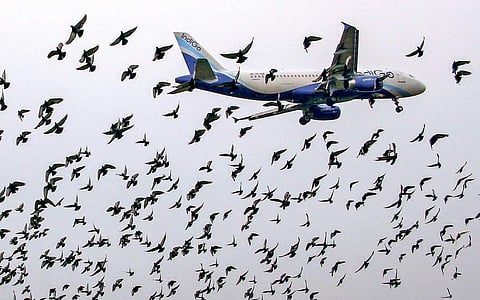

NEW DELHI: India’s aviation sector is predicted to become the third largest aviation market by 2024. However, the growing traffic is not resulting in growing fortune of aviation firm, with top players slipping into losses.
In the first 10 months (January to September) of 2018, passengers carried by domestic airlines stood at 1027.93 lakh, against 849.94 lakh during the same period in 2017, up by 20.94 per cent. But in the last two quarters, higher fuel prices and falling rupee value spoiled the party for the airlines, so much so that the existence of a major player, Jet Airways, is now in question.
The Mumbai-based carrier has grounded over a dozen of its planes and is struggling to pay salaries to its employees on time. Last checked, Jet Airways gave pink slips to 20 employees, including some senior executives. Likewise, Air India, the state-controlled airline, after a stale stake sale attempt, has got the government’s assurance of a revival package, but its chief Pradeep Singh Kharola recently said that the turnaround efforts have become more difficult with overall increase in operational expenditure and fierce competition.
As for the brighter players, the picture isn’t rosy either. Interglobe Aviation, the parent firm of IndiGo, the market numero uno which carries over 42 per cent of the domestic passengers, on Wednesday reported its first-ever quarterly loss since its listing in 2015 — a loss of `652 crore against a profit of `551 crore it made in the second quarter of last financial year.
IndiGo held higher fuel prices responsible for more than half of the profitability decline and the currency depreciation and lower yields for the remainder. With crude prices expected to remain volatile and competition in the sector high, the current fiscal might prove to be a tough year for the airline.
Similarly, SpiceJet, which reported a loss in the June quarter after nearly three years, is facing headwinds too. Rating agency Crisil recently downgraded its long-term rating on SpiceJet’s bank facilities from BBB stable to BB negative. It also downgraded its short-term rating from ‘A3+’ to ‘A4’, when reports emerged that SpiceJet has sought a three-month extension from a leasing company for making payments on aircraft leases as a delay in delivery of 737 Max planes by Boeing Co.
Analysts say every player is focusing on improving its market share without giving much thought on optimisation and profit. Peeyush Naidu, Partner, Deloitte India, said that eyeing multifold rise in passengers in the longer run, airlines have placed massive orders with Boeing and Airbus.
“With new additions, there will be pressure to fill seats. Besides, no player would like to give away their market share, so lower tariffs amidst a competitive market will yield pressure on each players bottomline,” Naidu said.
Analysts also expressed concerns on banks’ reluctance to provide funds for some airlines, especially Jet Airways, since the sector already has a history of defaulting (Kingfisher).